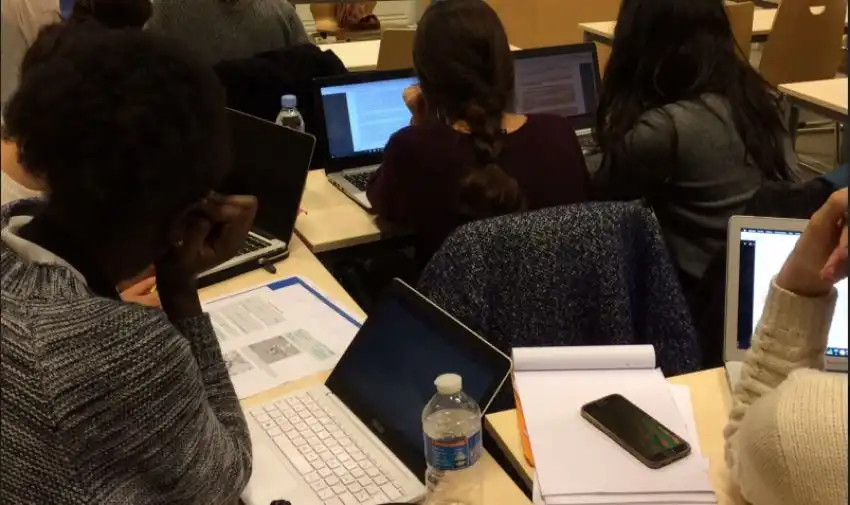Home>Make an appointment at the Clinic (of the Law School) !
20.10.2017
Make an appointment at the Clinic (of the Law School) !
It may be surprising to associate terms (apparently) belonging to very different universes and (at first glance) unrelated. Through 5 questions, Jeremy PERELMAN, Assistant Professor at Sciences Po, makes you discover the Law School Clinic he runs.
What is a Law Clinic ?
A Law « Clinic » makes us think of the medical universe – and this is not unrelated. The word indeed refers to “learning by doing” through clinical practice in University Hospitals (Centres Hospitaliers Universitaires), and to the concept of experimentation.
The purpose is therefore to confront the knowledge learned “in the books” with concrete situations of action and practice. This practice, instead of being carried out on “patients”, takes place through field work with pedagogical partners from the NGO as well as from the private and the public sectors. The Clinic builds projects with these pedagogical partners, on which the students will work within the curriculum of their Master studies. These projects all have a public interest and/or social justice dimension. Ultimately, the Clinic is both a community service and a pedagogical program providing students with a unique space for experimentation and “learning by doing”, while benefitting from a strong mentoring ensured by professors, teachers and practitioners. Students work on field projects and receive in parallel a specific training closely developed around these projects, which is both theoretical and practical.
Why a Law Clinic at Sciences Po ?
Sciences Po is the ideal place to develop such a programme. Initiated by students and teachers, the Law School Clinic is framed around its parallel pedagogical, experimental and social justice goals It was able to develop along these lines thanks to interdisciplinarity, which is a key strength of Sciences Po, but also to the contextual and reflexive approach to law, which is specific to the Law School. This unique context allows students to mix and draw on various topics , analytical methods and problem-solving tools, and apply them to for very concrete projects linked to complex contemporary issues.
What is being done at the Law Clinic? In what way ?
The Law School Clinic is one of only a handful of clinics worldwide to admit students from various graduate-level schools: along with Law School students, who remain the majority, the Clinic welcomes, for instance, students from the Paris School of International Affairs (PSIA) and from the Master in European Affairs.
Under the supervision of a tutor (who may be an alumnus from the Clinic, a PhD candidate, a practitioner or a Sciences Po Faculty member), each team of students dedicates at least half a day per week to the project it selected within one of the four programs of the Clinic: Access to Justice, Corporate Social Responsibility (RISE), Human Rights in the Context of Economic Development and Globalization (HEDG) and Migrations. In addition to this half-day of work on their clinical projects, students follow a a 24-hour clinical seminar each semester, which is specific to each of the four programs and offers both a theoretical and a practical lens to realize and analyze eachof the clinical projects. The clinical projects are selected beforehand by the Scientific Board of the Clinic.
Who are the stakeholders, the interlocutors ?
The main stakeholders are the students. They are the ones who make the Clinic and bring it to life. While the Clinic fosters professionalization and technical “hands on” training, this is not its unique goal. The Clinic encourages autonomous initiatives, both collective and individual. It also pushes students to adopt a critical, reflexive approach to law, to engage in a long-term reflection on professional ethics, and on different ways to infuse public interest values within a range of professional careers.
NGOs, private companies, public institutions and universities are the pedagogical partners of the Clinic.These partners, the tutors, the Faculty and more widely the whole Law School constitute the other “stakeholders”, in quite a unique ensemble which organized around the Clinic, and allows it to function as a network.
What are the projects on which the students are working this year ?
A number of projects are being carried out this year. I can mention among others: a project conducted with a major French industrial group, which consists in elaborating a methodology to enable this group to respect its commitments in the field of human rights (HEDG/RISE), a project which looks at the impact of the privatization of the education sector on the right to education (HEDG), a study of the paradox between the wealth of energy resources and the poor electrification level in the Democratic Republic of the Congo (DRC) (HEDG), a study for the Paris City Hall examining the compliance between principles of “circular economy” and those of public procurement (RISE), various projects dealing with issues linked to the situation of migrants in France, through a partnership with two associations, the Anafé and the Cimade (Migrations), and finally, a project in collaboration with the Defender of Rights, which enables the students to be involved in various forms of legal interventions including awareness prevention, legal mediation and legal research and investigation.
